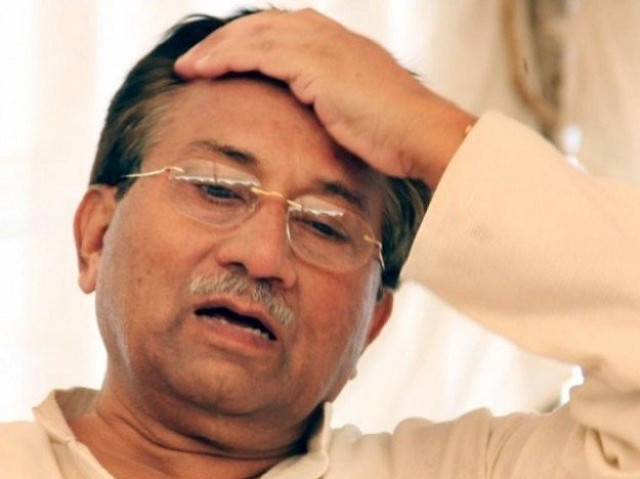Musharraf challenges death sentence in SC
Appeal filed despite LHC declaring death sentence ‘unconstitutional’

PHOTO: FILE
The three-member bench — headed by Justice Sayyed Mazahar Ali Akbar Naqvi — declared unconstitutional the filing of a complaint on high treason charge against the former president, and the formation of a special court as well as its proceedings, leading to the abolition of the death penalty handed down to him by the trial court on December 17.
The court, comprising judges of three high courts, awarded the sentence with a dissenting note from one judge who said that instead of capital punishment, the former military ruler should be awarded life imprisonment for imposing emergency and forcibly confining over 60 judges to their residences in 2007.
In reaction to the ruling, army had said that the decision was “received with lot of pain and anguish by rank and file of Pakistan armed forces.”
In his appeal, Musharraf alleged that the treason trial “suffered from interference and external pressures”.
“Appellant’s trial also suffered from interference and external pressures, and such interference manifested itself in the form of orders from the Supreme Court validating trial in absentia, upon an interpretation of Section 9 of the Criminal Law Amendment (Special Courts) Act 1976,” reads the appeal Musharraf has filed in the apex court through his attorney Salman Safdar. “The said order of the Supreme Court was passed in pursuance of an infructuous matter, pertaining to the issuance of a complaint of High Treason against the Appellant, which had already been done in 2013. Not only did the order directly impact and regulate subjudice proceedings, it did so by yielding a very narrow interpretation of S.9, which directly contradicts the earlier findings of the Supreme Court in its own Suo Motu verdict [PLD 2012 SC 553], wherein it was determined that the right to a fair trial should be interpreted as widely as possible to serve the interests of justice.”
Asked why the appeal was being filed despite the Special Court ruling being declared unconstitutional, the counsel told The Express Tribune that the high court had given a verbal order and filing an appeal was appropriate before the expiry of the 30-day deadline after the verdict.
Safdar said that the LHC had decided the constitutional petition, which had been filed before the announcement of the Special Court judgment. “The trial court announced its verdict when the matter was sub judice in the high court… it should have exercised restraint…,” he added.
Legal opinion, however, remains divided on whether the apex court can entertain the appeal before Musharraf — an absconder living in self-imposed exile in Dubai since 2016 on account of ill health — surrenders himself to the authorities.
According to sources, the Supreme Court’s registrar office may return the appeal on the ground that the convict did not surrender.
The appeal alleged that Musharraf did not receive a fair trial, and that Islamabad High Court’s guidelines to ensure a fair trial, were disregarded.
“The Learned Special Court had been directed to give the pleader to assist the Court as per S. 11(2) of the 1976 Act, a clear direction was given to decide on the application under S. 265-K Cr.PC filed by the Appellant, a fair opportunity was to be provided for the recording of statement under S. 342 Cr.PC, the Appellant was to be afforded an opportunity to lead defense evidence, skeleton arguments of the de-notified prosecution team were to be disregarded and the proceedings were to be conducted strictly in accordance with law,” it stated.
“The brazen disregard only points towards judicial bias. Convicting in absentia, denying the right to counsel, bypassing S. 342 and making a decision without hearing the defense leaves no room for any other possibility except judicial bias. This position finds fortification through a judgment of Supreme Court cited as PLD 2019 SC 668.”
The appeal pleaded that it was “shocking and unfortunate” that the Special Court wrapped up the trial that was far from its conclusion abruptly. “The recently appointed prosecution team had filed an application for amended charge to include Aiders & Abettors in the High Treason Case. The defence team, comprising the state appointed Counsel and privately engaged Counsel of Appellant had filed two Applications [Recording of 342 Cr.P.C / 6 (d) of the Criminal Law Amendment (Special Court) Act 1976 & Leading Defence Evidence] without entertaining these very crucial applications and completely ignoring section 6 (f), the Special Court retired for tea break and shockingly returned after 45 minutes with decision of guilty (2:1) and award of Capital Punishment,” it said.
The appeal stated that the Special Court opted to announce the verdict without deciding on four pending applications and hearing on the final submission of parties, arguing that this action alone was sufficient to aside the judgement.
“The provision of S.367 CrPC places a clear requirement on the Learned Special Court to pronounce judgment in writing, dated and signed by the Presiding officer at the time of pronouncement of Judgment. This provision was not complied with, in that an Oral Judgment was pronounced, without any short order being released and a full and final order being released with a two day delay after pronouncement of the verdict. Such proceedings, in the case of “State v. Anwar Begum [1994 PCr.LJ 441]” were declared to be an incurable defect, rendering the judgment,” it said.
The plea took strong exception to Paragraph 66 of the verdict, saying that desecration of a dead body was in contravention to the injunction of Islam, and violated human dignity.
In the said paragraph, Justice Waqar Seth giving his minority view ruled, “We direct the Law Enforcement Agencies to strive their level best to apprehend the fugitive/convict and to ensure that the punishment is inflicted as per law and if found dead, his corpse be dragged to the D-Chowk, Islamabad, Pakistan and be hanged for 3 days.”
It stated that the prosecution case suffered from an “admitted, noticeable and unexplained delay” of over five years from the date of the alleged offence, which could draw “adverse inferences”.
“…if the alleged offence was so heinous and so apparent, why did the prosecuting agency delay the initiation of the investigation and subsequent trial for such a long period of time. This delay serves to be fatal to the prosecution case as it reeks of malice and unfairness.”
The federal government, the plea stated, was being led by Nawaz Sharif, a known political opponent of the accused who bore a grudge against him. “…the present proceedings and Complaint No. 1 of 2013 were politically motivated and were initiated with ulterior motive and mala fide intentions resulting in obvious unfairness. The sole purpose and agenda behind initiating prosecution for High Treason was to politically target and embarrass the Appellant…”
The Special Court, it said, erred when it refused to hear the duly appointed counsel of Musharraf and informed him that he could no longer represent the appellant as recorded. The appeal stated that “the actions of the Federal Government and Learned Special Court in appointing an attorney on behalf of the Appellant who did not have the necessary experience, expertise or legal acumen to provide an effective representation severely damaged the Appellant’s right to a fair trial”.
“It is hereby stated that such appointment of defence counsel was made under an opaque criteria with no care to gravity of the matter before the Learned Special Court. The defense counsel was neither a lawyer licensed to practice before the Supreme Court of Pakistan nor someone having expertise in criminal laws, both of which should have been the bare minimum standards in a case of such import,” the appeal said.
At a time when the treason trial was reaching its conclusion, the Ministry of Interior had de-notified the prosecution team. A new team had been appointed which had then sought time to read over the record of the case.



















COMMENTS
Comments are moderated and generally will be posted if they are on-topic and not abusive.
For more information, please see our Comments FAQ